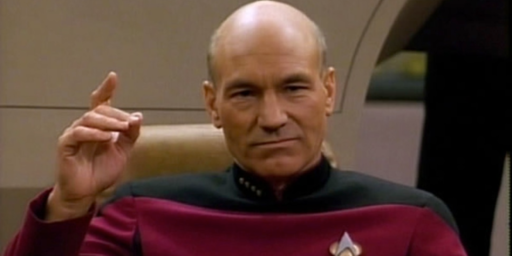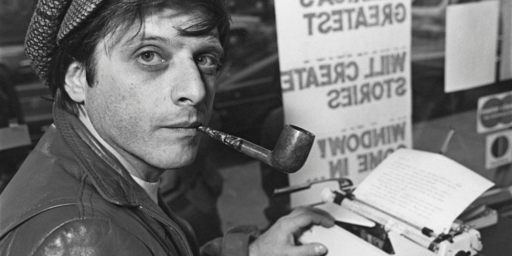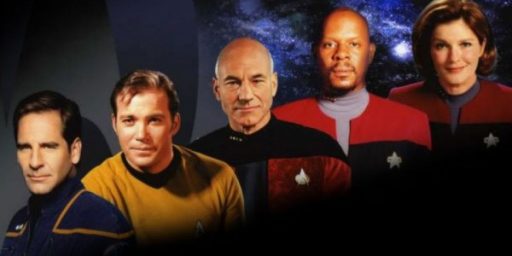Orson Scott Card: Star Trek Was Bad Science Fiction
Orson Scott Card argues that “Star Trek” never deserved its prominence and that “it’s about time” it died.
Strange New World: No ‘Star Trek’
The original “Star Trek,” created by Gene Roddenberry, was, with a few exceptions, bad in every way that a science fiction television show could be bad. Nimoy was the only charismatic actor in the cast and, ironically, he played the only character not allowed to register emotion. This was in the days before series characters were allowed to grow and change, before episodic television was allowed to have a through line. So it didn’t matter which episode you might be watching, from which year — the characters were exactly the same. As science fiction, the series was trapped in the 1930s — a throwback to spaceship adventure stories with little regard for science or deeper ideas. It was sci-fi as seen by Hollywood: all spectacle, no substance.
Which was a shame, because science fiction writing was incredibly fertile at the time, with writers like Harlan Ellison and Ursula LeGuin, Robert Silverberg and Larry Niven, Brian W. Aldiss and Michael Moorcock, Ray Bradbury and Isaac Asimov, and Robert A. Heinlein and Arthur C. Clarke creating so many different kinds of excellent science fiction that no one reader could keep track of it all.
Little of this seeped into the original “Star Trek.” The later spinoffs were much better performed, but the content continued to be stuck in Roddenberry’s rut. So why did the Trekkies throw themselves into this poorly imagined, weakly written, badly acted television series with such commitment and dedication? Why did it last so long?
Here’s what I think: Most people weren’t reading all that brilliant science fiction. Most people weren’t reading at all. So when they saw “Star Trek,” primitive as it was, it was their first glimpse of science fiction. It was grade school for those who had let the whole science fiction revolution pass them by.
Now we finally have first-rate science fiction film and television that are every bit as good as anything going on in print.
Charlie Kaufman created the two finest science fiction films of all time so far: “Being John Malkovich” and “Eternal Sunshine of the Spotless Mind.” Jeffrey Lieber, J.J. Abrams and Damon Lindelof have created “Lost,” the finest television science fiction series of all time — so far. Through-line series like Joss Whedon’s “Buffy the Vampire Slayer” and Alfred Gough’s and Miles Millar’s “Smallville” have raised our expectations of what episodic sci-fi and fantasy ought to be. Whedon’s “Firefly” showed us that even 1930s sci-fi can be well acted and tell a compelling long-term story.Screen sci-fi has finally caught up with written science fiction. We’re in college now. High school is over. There’s just no need for “Star Trek” anymore.
I enjoyed “Eternal Sunshine” and am a big fan of the “Smallville” series. I disagree, though, about the writing quality of the “Star Trek” series.
Episodic programming has to step outside its genre. “Star Trek” would have worked just as well, with rather minor changes, as a Western. A novel can subsist mostly on plot. A television serial depends on characters that the viewer wants to spend hour after hour with. Can anyone imagine “Eternal Sunshine” as a series? About two hours with Joel Barish and Clementine Kruczynski is about all I could take.
The original series offered some excellent characters, with the interaction between Kirk, Spock, and McCoy producing some of the best repartee in pop culture history. “Next Generation” offered some much more compelling science fiction and some enjoyable characters as well. That became less true once Roddenberry died and left the series under Rick Berman’s control.






Dude.
You know, I know, we all know the appeal that Star Trek has to the scifi community–just read Scott Adams’ Dilbert books if you’re really confused and can’t figure it out 🙂
Card seems far of the mark here. Classic Star Trek may have been light on science, but it has been the gateway drug for multiple generations of SF fans. It deserves our respect, if not our admiration.
…and by the way, Lost is neither ‘Best’ or science fiction. Jeesh!
“Star Trek” would have worked just as well, with rather minor changes, as a Western.
Of course!!! What did you think Roddenberry MEANT by “The Final Frontier”?
As for being bad science, well, again I answer… OF COURSE!
Science fiction is by definition, fantastic and incredible. It is the offspring of the more fertile imagination… imagination, of course is of course where ideas come from. To try and limit Sci-Fi to reality is to remove it’s soul.
Card’s off the mark on this one.
I certainly read deeply of Asimov, Bradbury, Dick, Clarke and Heinlien growing up. “Have Spacesuit Will Travel”, etc.. In no way did this detract from my admiration for the quality of the science fiction writing in the original Star Trek. What about its imagining of videoconferencing, cell phones, stealth fighters, voice recognition, etc… I could go on.
Not only did Gene R. take care to make the incredible credible, but he did so in a funny, sexy and even outrageous (for the time) way. Sure Shatner over-acted and the sets were cheesy. But that only made Star Trek more of an exercise in suspending disbelief which when attained increased the level of devotion.
(By the way Vulcans on the show always made a big deal about their cold logic, but there are plenty of episodes where Spock showed emotion!)
OSC overstates the case.
But only a little.
Certain first-season episodes, like The Devil in the Dark, were very good science fiction. Regrettably, they became fewer as Roddenberry chased away the best screenwriting talent.
I have found the newer spinoffs increasingly polished and increasingly uninteresting. Deep Space Nine, with its film noir overtones, was probably the best.
The Borg story line was the only really interesting feature of Next Generation. It’s true that the series became markedly less puerile after Berman took over, but that’s not a very high bar.
Voyager had me ready to throttle Janeway by the end of most of the episodes, so I stopped watching. If I wanted practice at anger management, I would be watching the network news.
I’ve never bothered with the latest Star Trek.
Your headline should be “Orson Scott Card desperately wants readers” because this is nothing but shock value.
Next in the series: Why Star Wars had really bad special effects.
I can buy “Lost” as sci-fi, its definitely one of my favorite shows on TV. Ever. Buffy and Angel as sci-fi? I’d definitely skew them more towards the fantasy/mystical. No science there.
Firefly was definitely a fantastic show, if ever there was true successor to “wagon train to the stars”, as Roddenberry called Trek (which, no surprise here, is why Trek was very ‘westernly’), this was it.
But he apparently didnt give much thought to Deep Space 9. It was less the utopian future as painted by Roddenberry, definitely darker, and had significantly more depth then any of the other series. Hell, it even had some of the best space battles put to screen.
Some of the comparisons OSC makes definitely dimish his credibility in the matter. One thing he needs to remember is that there’s plenty of room out there for various kinds of sci-fi, and to say that Star Trek, the stepping stone/gateway to more “serious” sci-fi as an anomalous success, well, that’s just being closed minded…. Bah, brb, gonna go watch some Battlestar Galactica (the new version)…
I think Card has a good point about Star Trek’s popularity deriving from its being the only SF its initial viewers had seen. But its survival and spinoffs suggests there’s something else … something that terrible writing cannot squelch.
The Science part of the S/F was either missing or not there; but the acting was good. Bill did not go on to star in three other TV series bacause his acting was fair. I read Aldiss,Anderson, Assimov, Heinlien, van Vogt, et. al before I ever saw my first Star Treck. And I still liked Trek, not as SF but as fun.
I find the author ill informed, condescending and elitist. Who is he to judge what is worthy science fiction? Disgusting.
Star Trek has inspired pilots, astronauts, engineers, physicists, on and on. They make a difference. They bring the future closer to us.
That is not bluster, Trek can prove it.
Sorry charlie. That IS good science fiction.
Star Trek has been popular for nearly 40 years. It is an American icon embraced world wide.
Other shows have made returns. Famliy Guy, Farscape, Firefly. Enterprise is in trouble more do to politics, and the fact that nielsens are not keeping up with the new ways people view shows. People are downloading episodes. Time for Viacom/Paramount to join the rest of us int he 21st century and provide suscription services to download and view. Visit http://www.trekunited.com if you want to put up a fight for Enterprise.